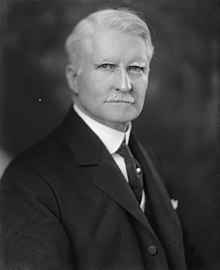Lawrence Tyson | |
|---|---|
 Official portrait, c. 1905 | |
| United States Senator from Tennessee | |
| In office March 4, 1925 – August 24, 1929 | |
| Preceded by | John K. Shields |
| Succeeded by | William E. Brock |
| Speaker of the Tennessee House of Representatives | |
| In office 1903–1905[1] | |
| Preceded by | Edgar B. Wilson |
| Succeeded by | William K. Abernathy |
| Personal details | |
| Born | Lawrence Davis Tyson July 4, 1861 Pitt County, North Carolina, U.S. |
| Died | August 24, 1929 (aged 68) Strafford, Pennsylvania, U.S. |
| Political party | Democratic |
| Spouse | Bettie Humes McGhee[2] |
| Children | Charles McGhee Tyson Isabella Tyson (Gilpin)[2] |
| Alma mater | U.S. Military Academy West Point, New York, USA |
| Occupation | Soldier, politician, lawyer, businessman |
| Awards | |
| Signature |  |
| Military service | |
| Branch/service | U.S. Army Tennessee National Guard |
| Years of service | 1883–1896, 1898–1899, 1900–1906, 1917–1919 |
| Rank | |
| Commands | 6th Regiment U.S. Volunteer Infantry (1898–1899), 59th Brigade, 30th Infantry Division (1917–1919) |
| Battles/wars | Apache Wars, Spanish–American War, World War I |
Lawrence Davis Tyson (July 4, 1861 – August 24, 1929) was an American brigadier general, politician, lawyer and textile manufacturer, who operated primarily out of Knoxville, Tennessee during the late 19th and early 20th centuries. During World War I, Tyson commanded the 59th Brigade of the 30th Infantry Division, then served as a Democratic United States Senator from Tennessee from 1925 until his death.[2]
A graduate of West Point, Tyson first saw military action during the Apache Wars in the 1880s. He moved to Knoxville in 1891 to teach military science at the University of Tennessee, became a lawyer and also led the 6th Regiment, Tennessee Volunteer Infantry during the Spanish–American War. Tyson helped organize the Knoxville Cotton Mills in the early 20th century and served as president of the second Appalachian Exposition in 1911.[2] From 1902 to 1908, Tyson served in the Tennessee House of Representatives, and was Speaker of the Tennessee House from 1903 to 1905. During the Hundred Days Offensive of World War I, the 59th Brigade, under Tyson's leadership, became one of the first Allied brigades to break through the Hindenburg Line.[3]
- ^ Historical and Constitutional Officers of Tennessee, 1796 – Present, Territory South of the River Ohio, 1790–1796 Archived May 12, 2014, at the Wayback Machine. Retrieved: September 26, 2012.
- ^ a b c d Cite error: The named reference
rothrockwas invoked but never defined (see the help page). - ^ W. Calvin Dickinson, Tennessee's General: Lawrence Tyson In World War I[usurped], SouthernHistory.net, July 1, 2003. Retrieved: February 3, 2011.